We are reader-supported. When you buy through links on our site, we may earn an affiliate commission. Learn more
Are Blackberries Good For You and What Do They Look Like?
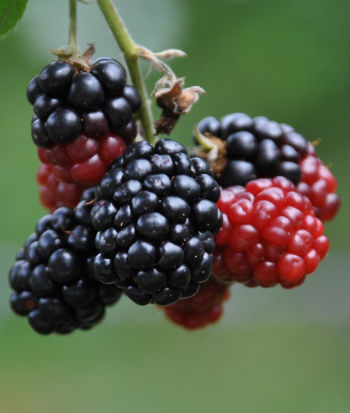
I’m happy to say that blackberries are very good for you!
There's been extensive research done on blackberries, from finding out nutrient content to comparing them to other berries like blueberries and black currants.
All to see if and how blackberries can help in avoiding and curing diseases/illnesses.
The berries are dark blue/purple almost black in color and have the same shape as raspberry. They're packed with nutrients.
In my opinion the blackberries should be classified as the new super berry! Although the blackberry is actually botanically classified as a fruit.
But when the fruit has the word berry in its name I'll still call it a berry.
Blackberries are among the healthiest berries you can find.
They are especially noted for their antioxidant concentration. In fact, they have a high ORAC ◳ (oxygen radical absorbance capacity) rating.
ORAC is a unit of measurement for antioxidant content.
They are also high in dietary fiber, vitamin C, vitamin K, folic acid and manganese.
As with most berries, you get the maximum health benefits when you eat them raw.
Some of the vitamins and other nutrients are diminished or lost in cooking, although the cooked berries are usually still beneficial.
Adding blackberries to you regular diet will do your body a lot of good.
The flavonoids will help you maintain a healthy heart and the high fiber content will help keep your stomach in check.
Eating blackberries regularly can also reduce the risk of fractures and blood clotting disorders.
Table of Contents
What Nutrients Are There In Blackberries?
Blackberries are notable for their high nutritional content of especially dietary fiber, vitamin C, vitamin K, folic acid and the mineral manganese.
Blackberries also have a significantly high content of potassium.
All blackberries contain a compound called salicylic acid.
This compound has been used since the Middle Ages for its medicinal benefits.
Salicylic acid has been proven to numb physical pain and lower high fevers.
Blackberries consist of lots of large seeds that are neatly packed together to form the fruit.
The seeds contain an oil which is rich in omega-3 (alpha-linolenic acid) and omega-6 fats (linoleic acid), as well as some protein, dietary fiber, carotenoids, ellagitannins and ellagic acid.
The research tells us that the nutrients in the blackberries contribute to
- Improved immune function
- Digestive health
- A healthy heart function
- Prevention of cancer
- Weight management
- Strong bones
- Improved eye sight
- Proper blood clotting
- Healthier skin
- Improved memory
- and Various cognitive benefits
As you can see, blackberries are so nutritious that the blackberries may be considered one of the best berries you can consume.
Studies On The Nutrient Content In Blackberries
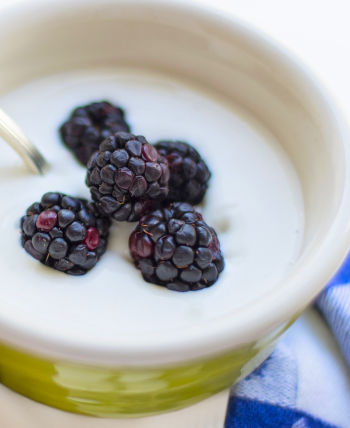
There has been much research done on blackberries.
What seems to be common result of this research is that blackberries are a very useful berry that everyone should eat.
I've not encountered any negative effects of eating blackberries in any of the research I've read, but of course, you should always eat with moderation and not overdo it.
A study was published 2009 in the medical journal "Nutritional Neuroscience" that indicated that blackberry intake may have a positive impact on motor and cognitive skills, which often decline with age.
The researchers fed blackberries to aged rats for 8 weeks, after which they tested their ability to perform a series of tasks.
The rats that ate a diet supplemented with blackberries, displayed better motor performance, balance and coordination than the control group.
The blackberry eating rats also showed significantly greater short term memory performance.
The researchers believe that the polyphenols in blackberries increase antioxidant levels enough to make them potentially beneficial to aging adults. ◳
Pharmacognosy Reviews presented in 2014 blackberry use as an herbal medicine. ◳
They looked at the wild grown European blackberry and their conclusions were:
- Plants of R. fruticosus are widespread in northern countries of the world
- It has a lot of medicinal use
- Various blackberry plants are useful in the treatment of
- Cancer
- Dysentery
- Diarrhea
- Whopping cough
- Colitis
- Toothache
- Anemia
- Psoriasis
- Sore throat
- Mouth ulcer
- Mouthwash
- Hemorrhoids
- and Minor bleeding
- Blackberries have different pharmacological activities, for instance
- Anticancerous
- Antimicrobial
- Antioxidant
- Antidysentery
- Antidiabetic
- and Antidiarrheal
- Blackberries contain high amounts of phenolic flavonoids such as
- Anthocyanins
- Ellagic acid
- Tannin
- Quercetin
- Gallic acid
- Cyanidin
- Pelargonidin
- Catechins
- Kaempferol
- and Salicylic acid
Scientific studies suggest that these antioxidant compounds may have potential health benefits against cancer, aging, inflammation, and neurological diseases.
BAC (Bioactive Compounds) In Berries
Antioxidant levels in berries have been the focus for many studies.
One published in the International Journal of Molecular Sciences in 2014 was called, Bioactive Compounds and Antioxidant Activity in Different Types of Berries. ◳
They found out that berries, especially members of Rosaceae family, such as (strawberry, raspberry and blackberry), and Ericaceae family (blueberry and cranberry) are great dietary sources of bioactive compounds ◳ (BAC).
BAC (phenolic compounds such as phenolic acids, flavonoids-flavonols, anthocyanins, tannins, and ascorbic acid) are contained in berries in great amount, and may act as strong antioxidants and, thus, could help in the prevention of inflammation disorders, cardiovascular diseases, or have protective effects to lower the risk of various cancers.
Do Blackberries Have Antioxidants?
Yes, as mentioned earlier blackberries contain lots of healthy antioxidants.
Blackberries rank high among fruits for antioxidant concentration, particularly due to their dense content of polyphenolic compounds, such as:
- Ellagic acid
- Tannins
- Ellagitannins
- Quercetin
- Gallic acid
- Anthocyanins
- and Cyanidins
Antioxidants are important compounds for our bodies to fight diseases.
They are believed to help prevent and repair the stress that comes from oxidation.
A small percentage of our cells are damaged during oxidation and turn into free radicals.
This can lead to a chain reaction that might harm more cells.
Anthocyanins in blackberries
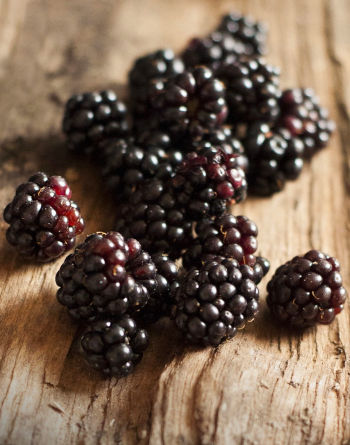
Purple-, dark red- and blue-colored fruits and vegetables get their pigments from specific antioxidants called anthocyanins.
These compounds, which are also known as flavonoids, reduce the risk of heart disease, stroke and cancer.
Blackberries contain high levels of anthocyanins.
With their dark blue, almost black color, blackberries have one of the highest antioxidant levels of fruits. Blackberries contain 83-326 mg of anthocyanins per 100g.
Anthocyanins are colored pigments in plants that possesses several health benefits.
Anthocyanins are valuable colorants that helps in preventing several diseases, including cardiovascular diseases, cancers, diabetes, some metabolic diseases, and microbial infection.
These compounds also improve visual ability and have neuroprotective effects. ◳
Anthocyanins concentrated dark pigment of blackberries is proven to decrease the rate with which memory deteriorates.
In other words, the blackberries actually enhances beneficial signaling in your brain. ◳
Ellagic Acid and Cyanidin in blackberries
Two of the very beneficial substances in the blackberry are ellagic acid and Cyanidin.
Ellagic acid is a phytochemical, which means its only found in certain plants.
Cyanidin 3-glucoside has been found to have chemotherapeutic and chemo-protective abilities.
The ellagic acid possesses antioxidant, antimutagenic and anticancer properties. ◳
In experimental studies, ellagic acid was used to treat tumors in lab mice ◳ and it was shown to kill some forms of cancer cells.
Researchers believe that ellagic acid may also work to reduce the harmful effects of estrogen that is a factor in the creation of breast cancer cells.
Ellagic acid is a potent ingredient in blackberries that has also been shown to inhibit cancer formation, while myricetin has antioxidant abilities.
This beneficial combination of chemicals in blackberries may effectively prevent cancer ◳ more than any one of the individual chemicals alone.
What Vitamins And Minerals Are There In Blackberries?
There are several healthy Vitamins and Minerals in blackberries, for instance:
Vitamins
- Vitamin C, B-6, A, E, K
- Thiamin
- Riboflavin
- Niacin
- Folate
Minerals
- Calcium
- Iron
- Magnesium
- Phosphorus
- Potassium
- Zinc
Vitamin C is a water-soluble vitamin that boosts immunity, promotes connective tissue strength and aids with wound healing.
One cup of blackberries contains 30 milligrams of Vitamin C, 50% of Recommended Daily Intake (RDI).
Vitamin K is a pivotal fat-soluble vitamin for the prevention of blood clotting.
It's also important for bone strength because it helps with the absorption of calcium.
Blackberries has a high dose of vitamin K.
A cup of blackberries has about 28 micrograms, which is 36 percent of RDI.
Vitamin A is another fat-soluble vitamin that helps with vision, immune function and cell production.
Blackberries have a high content of vitamin A. One cup contains 38 international units.
Potassium is a mineral that is crucial for your muscles and nerve conduction.
It's also involved in maintaining a healthy blood pressure and regular heart beat.
There are 162 mg of potassium in 100 g of blackberries.
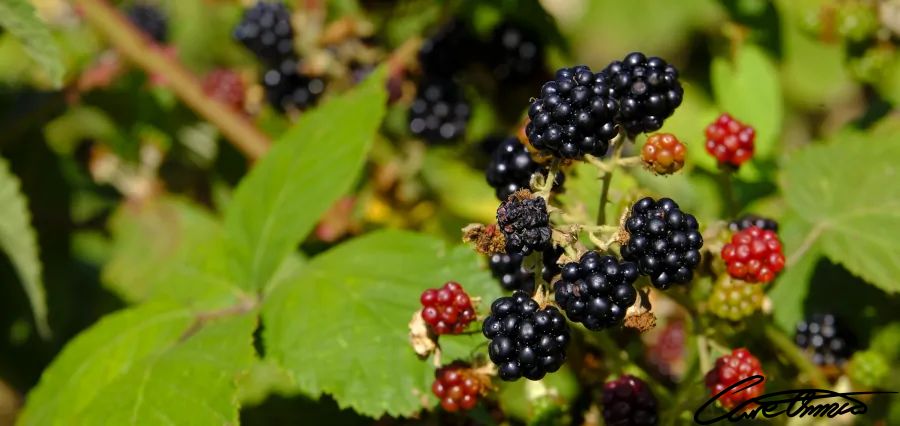
How Much Sugar Can You Find In Blackberries?
According to USDA Database the sugar content per 100 g of blackberries is 4.88 g.
There are two types of sugars in foods: naturally occurring sugars and added sugars.
Naturally occurring sugars are found naturally in foods such as fruit (fructose).
Added sugars include any sugars or caloric sweeteners that are added to foods or beverages during processing or preparation.
Natural occurring sugars are considered healthier than any other form of sugar, but that doesn't change the fact that they are still sugar.
Whenever you consume fructose, your body must process it and break it down to glucose.
But your body needs to work harder with the added sugar then the fructose.
The American Heart Association (AHA) recommends ◳ no more than 6 teaspoons (25 grams) of added sugar per day for women and 9 teaspoons (38 grams) for men.
Sugar in fruits differs from regular sugar
The type of sugar you can find in blackberries is the naturally occurring sugar called fructose, which also is called fruit sugar.
Fructose is an energy-rich, simple sugar.
Although fructose is called fruit sugar, large amounts of fructose are rarely found in fruit.
The sugar in fruit is harmless for most people, but regularly eating food that contains fructose-based sweeteners can be dangerous.
You need to remember that there is a difference between fructose in fruit and fructose based sweetener.
When eating fruit you get alot of other nutrients with your sugar intake so the benefits of eating fruits are higher than the negative effects of eating the sugar.
Total sugars in raw blackberries
4.88 g per 100g
7.03 g per cup (144g)
WHO dietary advice regarding added sugar ◳ states that your sugar intake should not exceed more than 5 percent of the total calorie intake per day.
US dietary recommendations state that you can eat up to 10% of the total calorie intake per day in sugar.
The World Health Organizations recommendation is half of the US.
WHO believes their level of sugar intake is more beneficial in preventing health risks such as weight gain, caries and diabetes.
How Big Is A Serving Size Of Blackberries?
A serving size of blackberries is usually set to a cup. A cup is 144 g.
One cup of blackberries contain 62 calories, 13.8 grams of carbohydrate, and 7.6 grams of fiber.
The Recommended Dietary Intake, (RDI) for fiber is 25 to 38 grams daily, therefore, one cup of blackberries provides you with nearly a third of your fiber needs for the entire day.
What Is The Scientific Name Of Blackberry Fruit?
Blackberry is a fruit produced by many species in the genus Rubus in the family Rosaceae. Blackberries is also called:
- Lawers
- Thimbleberry
- Dewberry
- Bramble
- Brambleberries
- and also as black caps
The blackberry family is complex and consists of a large number of species, subspecies and forms, which are among the most difficult in our flora. Cultivated varieties are also often hybrids of different species.
The nutritional value of those varieties is not much different, although the size and flavor can be different from one variety to the other. The good thing is, you are likely to get all the benefits whichever blackberry you eat.
Previously, blackberries were considered to be a single species, which was then called Rubus fruticosus. This name is still used sometimes for naming all blackberries.
What Do Blackberries Grow On?
The blackberry bush has strains that grow in more or less horizontal arcs lying on the ground, on walls, on surrounding bushes and so on.
Most of the blackberry species have thorns.
The berries grow on 2+ year-old stems.
The first year the stem is an unbranched new strain and in the second year it becomes the main stem for a lot of suckers with flowers, and then it withers when the fruit has ripened.
The berries does not ripen at the same time even though they grow on the same stem.
You can find berries in all its stages (ripe, ripening and unripe) on the same stem. Blackberries are red before they ripen, leading to an old expression that "blackberries are red when they're green".
Blackberries grow on brambles
Just as raspberries, blackberries too grow on shrubs known as brambles.
Bramble is a rough, tangled, prickly shrub, usually in the genus Rubus.
What differences the blackberry from the raspberry is that when someone picks a blackberry fruit, the torus stay with the fruit.
With a raspberry, the torus remains on the plant, leaving a hollow core in the raspberry fruit.
In the western US, the term caneberry is used to refer to blackberries and raspberries as a group rather than the term bramble.
Blackberries are not berries
The blackberry is botanically not a berry.
Botanically it’s classified as an aggregate fruit, composed of small drupelets. It's a widespread and well-known group of over 375 species.
The blackberry is technically not just one fruit.
Each blackberry consists of 80-100 small drupelets that are arranged in a circular fashion, akin to a miniature grape bunch, very much like the raspberry.
Most of the blackberry species have thorns, but there are thorn less varieties.One advantage of the thornless variety is that you can pick your delicious blackberries a whole lot easier. Thornless varieties do tend to be somewhat more sensitive to cold weather.
So if you can’t find a thorn less bush I recommend that you wear a long sleeved vest and some gloves to protect your hands and arms from the vicious thorns.
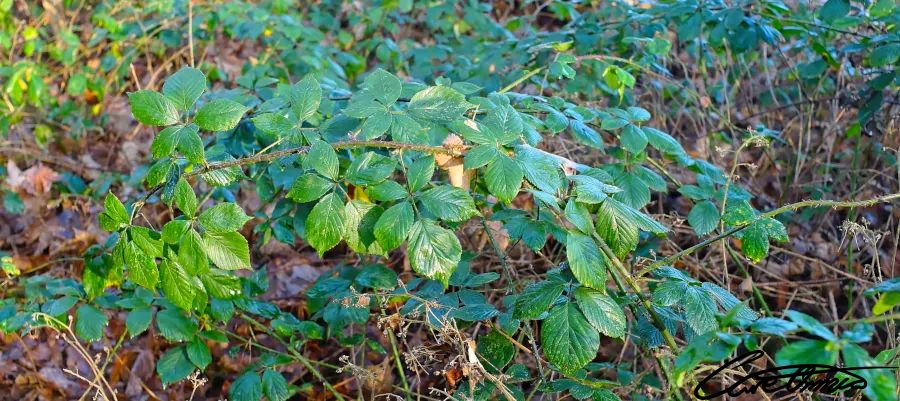
How Do Blackberries Spread?
Blackberries are long-lived plants. They are remarkably resilient.
You can find them growing in many unexpected places because of the way it spreads.
Blackberry bushes spread in two different ways. The first way is by seeds and the other is by suckers.
The seeds of the blackberries are spread by animals over greater distances.
The ripe berry is eaten and their seeds is then dispersed.
For example by the red fox and the eurasian badger, as well as by small birds.
The bush spreads itself by its suckers.
This happens so quickly that the plants are in some places considered a weed.
The bush sends down roots from branches that touch the soil, and the roots themselves grow suckers.
A sucker is a plant growing not from a seed but from a stem of the root at the base or at a certain distance from a tree or a shrub.
How To Eat Blackberries?
Blackberries are very tasty and you can eat them in many different ways.
You can eat them raw, heated, cooked, in pastry, in food, in beverage or how ever you like.
The sky is the limit!
You might be tempted to eat all the berries you can find as you pick the, but I recommend you resist the temptation until you've washed the blackberries thoroughly as the blackberry bushes are home to all kinds of bugs and might even have some airborne pollutants, depending on were you pick them.
You're good to go after you've washed them carefully!
Eat them raw or make something of them, like a good blackberry jam or pie
But, don't wash them until you are ready to eat, use or freeze them.
Washing makes them more prone to spoiling.
Buy or pick the berries when they are in season and freeze them, without sugar or syrup, to enjoy them throughout the year.
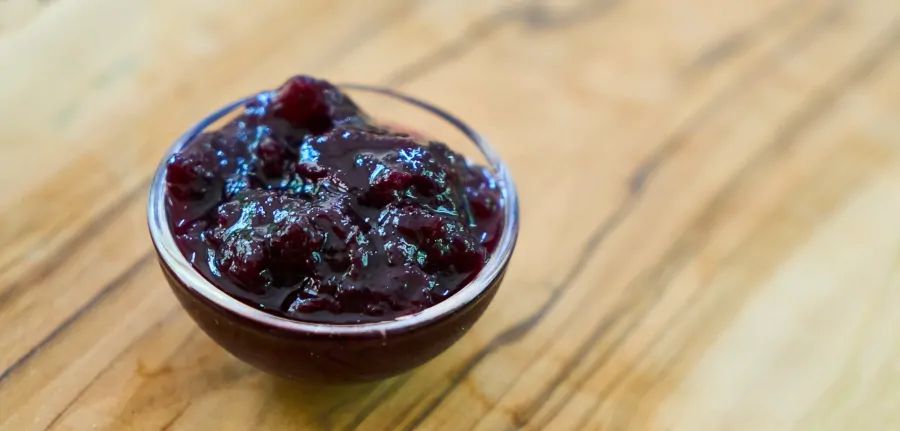
Use blackberries with everything (almost)
You can use blackberries in many different ways.
You can
- Eat them as they are
- Make some delicious blackberry jam
- Blackberry pie is amazing
- Pastry tarts with blackberries
- Blackberry sauce for meats
- Healthy blackberry smoothies
- Mix them in a fruit salad
- Or why not on your breakfast yogurt or your oatmeal?
It's only your imagination that sets the limit of what you can use blackberries for!

Remember that some of the nutrient in blackberries are sensitive to heating, which means that if you cook or heat the berries in some way, some of the nutrient content might be reduced or even disappear completely.
There is a very nice and tasty brand of blackberry jam #ad that you can find through Amazon.
It has no added sugar which I recommend.
I always choose the no added sugar variety and all natural ingredients if possible.
How To Tell When Blackberries Are Ripe?
As blackberries ripen, their color changes from pale green through a pink/red color to purple, becoming very dark purple or shiny black when ripe.
You should only pick the largest, darkest fruit, avoiding those that appear wet, moldy or squashed.
When you're about to pick the berries, select plump, firm, fully black berries.
Unripe berries will not ripen once picked.
The ripe berries will pull free from the plant with only a slight tug.
Are Blackberry Leaves Edible?
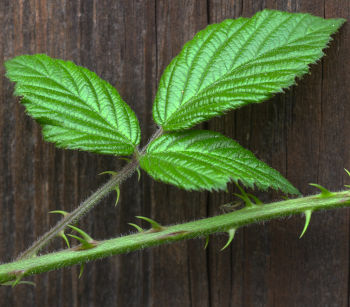
Yes, they are edible, but it’s not that common to eat the leaves as they are.
But there is one thing that blackberry leaves are commonly used for: making delicious tea!
In a study made in 2014 ◳ points out that the leaves can be used internally for diarrhea, gastrointestinal tract, colon inflammation and hemorrhoids.
Use 1–2 tablespoons of blackberry leaves per cup, strain after 10–15 minutes and drink several times a day between meals.
You can also drink a blend of blackberry and raspberry leaves.
It contains a lot of tannins.
Tannins have the ability to work preventative against urinary tract disorder.
This was shown in a Finnish study presented in the British Medical Journal ◳
Tea made from blackberry leaves

If you're interested in buying a good blackberry tea I recommend you check out this organic blackberry leaf tea #adthat's available through Amazon.
It's loose leaves so it's easy to measure for that perfect cup of tea just like you want it.
According to the book North America Cornucopia, written by Ernest Small, during the civil war blackberry tea was said to be a cure for dysentery ◳.
During outbreaks of dysentery, temporary truces were declared to allow both Union and Confederate soldiers to "go blackberrying" to avert the disease.
Some boil blackberry leaves.
By doing that you get a face or gargle water that has an astringent effect.
Leaves were traditionally consumed to treat gum inflammation and sore throat.
Blackberry leaves may be a better food for animals than humans.
The leaves are very tasty food for some caterpillars and some mammals, especially deer.
They are very fond of the blackberry leaves.
Conclusion: Blackberries, A Healthy Choice For Healthy Living
Blackberries are special.
I agree with the research that blackberries may be one of the healthiest berries (or fruits) you can eat.
I think it’s right up there with the European blueberries (bilberry) which are also crazy nutritious.
If you want to make a healthier choice I would definitely consider adding berries to your diet.
It’s a small change that's very easily done.
When you are about to make changes and want them to stick, the best way to go about that is not to make big or many changes at once.
Make small incremental changes and add more as you go along instead.
That way it’s more likely that you'll keep your new healthy habits over time.


